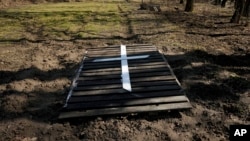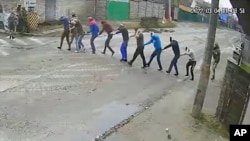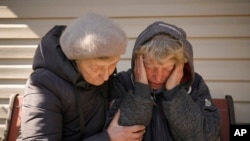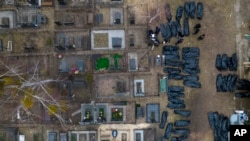The first man arrived at 7:27 a.m. Russian soldiers covered his head and marched him up the driveway toward a nondescript office building.
Two minutes later, a pleading, gagged voice pierced the morning stillness. Then the merciless reply: "TALK! TALK!"
It was a cold, gray morning, March 4 in Bucha, Ukraine. By nightfall, at least nine men would walk to their deaths at 144 Yablunska Street, a building complex that the Russians turned into a nerve center of violence that would shock the world.
What happened that day in Bucha was called "zachistka" by Russian soldiers on intercepted audio calls — cleansing. The Russians hunted people on lists prepared by their intelligence services and went door to door to identify and kill potential threats. The Associated Press and the PBS series "Frontline" obtained surveillance camera footage from Bucha that shows, for the first time, what a cleansing operation in Ukraine looks like.
Police ended up recovering nearly 40 bodies along Yablunska Street alone. Prosecutors have so far identified 12 around 144 Yablunska; AP reporters documented a 13th body in the stairwell of one of the buildings in the complex, in photos and videos taken on April 3.
__
As part of a joint investigation, the AP and "Frontline" reviewed hundreds of hours of video from surveillance cameras in Bucha and verified audio recordings of phone calls by Russian soldiers with The Dossier Center, a London-based investigative group. SITU Research, a New York-based visual investigations firm, helped reconstruct events using a 3D model of Bucha.
___
On March 3, a seemingly endless convoy of Russian firepower wound into Bucha along the railroad tracks. The order went out: Evacuate.
In the chaos of the Russian advance, eight Ukrainian checkpoint volunteers got separated from the others. They ducked into a pale brick house nearby and listened in silence to the searing crack of rifles and rumble of Russian tanks.
Around 10 a.m. the next day, checkpoint volunteer Andrii Dvornikov called his wife, Yulia Truba, and told her to delete all evidence of their communications.
Not long after, Russian soldiers broke down the door of the house and hauled nine men away, accusing them of helping Ukraine's military. Two Russian soldiers led the men at gunpoint down the wet, icy road to 144 Yablunska, cursing at them as they shuffled along in their stockinged feet.
Soldiers forced them to their knees. Then taxi driver Ivan Skyba saw them lift up the man next to him and shoot him in the head.
Over the next few hours, soldiers delivered more and more people to 144 Yablunska, including Dmytro Chaplyhin, 20, a baby-faced store clerk whom everyone called Dima. As the soldiers took Dima away, his grandmother, Natalia Vlasenko, fell to her knees and begged them not to touch him, to no avail.
"Grandma, don't worry!" Dima called as he left with the soldiers and headed for 144 Yablunska Street. "I will come back!"
It was the last time she saw him alive.
When the Russians marched Iryna Volynets to 144 Yablunska, she recognized one of the men lined up in the driveway as her old school friend, Andrii Verbovyi. He was slumped over on his side and bleeding. She saw him trembling, and they locked eyes.
Shaken, Volynets didn't immediately notice that her own son, Slava, was also kneeling in the line of doomed men. She finally recognized him by his jacket and pants. He'd taken a blow to the ribs and was breathing heavily.
She panicked, desperate to negotiate Slava's release. The Russians brought a young man over to take a close look at Slava.
"Is it him?" they asked.
"No, not him," the young man answered.
Slava lived. The Russians let most of the civilians go that day, but not the volunteers.
Skyba was hit in the face so hard it knocked his teeth out. His eyebrow split open, and blood gushed down his face. Russians tied his hands with tape behind his back, put a bucket over his head and kneeled him against a wall. They beat his head until he lost consciousness.
"What should we do with them?" Skyba heard a Russian say. "Kill them," another answered. "But take them away first so they're not lying around here."
Russian soldiers led the volunteers around the corner to a small courtyard where there was already one dead body. Then two soldiers started shooting.
Skyba felt a bullet pierce his side, and he hit the ground. He pretended to be dead, terrified the Russians would see his exhalations cloud the cold air.
"I was waiting for the darkness," he said. "Terrible ... I cannot explain ... just terrible."
Once it was silent, Skyba worked his wrists out of the tape that bound them, crawled through the corpses of his comrades and stole boots from the body of the only man who still had them on. He ran to a neighboring house.
Then he heard voices. Russians.
"Is anybody here in the house?" a man called. Skyba pretended to be the owner.
Believing him to be an injured civilian, the soldiers took him back to 144 Yablunska, this time for medical treatment, Skyba said. They led him to the basement, where more than 100 people were being held.
For the next three days, Skyba huddled there, telling no one about his bullet wound. The only toilet was broken. Children cried. Adults prayed.
On March 7, Skyba and the others were allowed to leave the basement. Everyone else who had been captured with him, except for one who gave information to the Russians, was dead. He retrieved his eyeglasses, which had fallen near a body, and walked out.
Russian soldiers told their families on phone calls about the carnage. One soldier named Maksym told his wife on March 21: "I think I'm going crazy. I've already killed so many civilians."
Now, the families of Bucha are waiting for a justice that may or may not come. Dvornikov's wife, Truba, along with Skyba and relatives of two other people killed at 144 Yablunska, has filed a case against Russia at the European Court of Human Rights.
"All the civilized world must recognize it was murder," she said. "I want to prove it's not fake and that it really happened."







